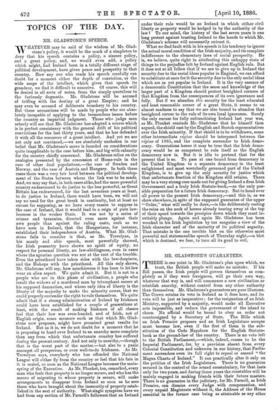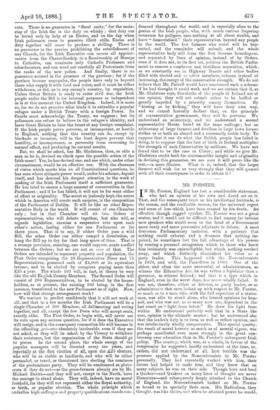MR. GLADSTONE'S GUARANTEES. T HERE is one point in Mr. Gladstone's
plan upon which, we trust, the British people will make no mistake. If his Bill passes, the Irish people will govern themselves as com- pletely as if they were foreigners, will go their own way, whatever that way is, and will commence a new civilisation or establish anarchy, without control from any other authority than themselves. Mr. Gladstone's guarantees are pure illusions. The Crown retains its veto in Ireland as it does here, and its veto will be just as inoperative ; for the resignation of an Irish Ministry, supported by a majority, would make all Executive acts impossible, and reduce the government of the island to chaos. No official would be bound to -obey an order not countersigned by a Secretary of State. The Bills which an Irish Premier proposes and an Irish Legislature accepts must become law, even if the first of them is the sub- stitution of the Code Napoleon for the English Statute- book as the ground-law of the country. There is no veto left to the British Parliament,—which, indeed, ceases to be the Imperial Parliament, for, by a provision absent from every Colonial Constitution and unknown in our history, that Parlia- ment surrenders even its full right to repeal or amend "the Magna Charta of Ireland." It can practically alter it only on the petition of the Irish Legislature. There is no guarantee secured in the control of the armed constabulary, for that lasts only for two years, and during those years the constables will be mainly engaged in making friends with their future masters. There is no guarantee in the judiciary, for Mr. Parnell, as Irish Premier, can dismiss every Judge with compensation, and every unpaid Magistrate without it, the Address of the House essential in the former case being as attainable as any other
vote. There is no guarantee in "fiscal unity," for the main- stay of the Irish fisc is the duty on whisky ; that duty can be levied only by help of an Excise, and on the day when Irish policemen cease to perceive illicit stills, Excise and duty together will cease to produce a shilling. There is no guarantee in the proviso prohibiting the establishment of any Church, for the Irish Executive can secure all appoint- ments from the Chancellorship to a Receivership of Stamps to Catholics, can nominate only Catholic Professors and schoolmasters, and can weed out carefully all Protestants from the ranks of the new police. And finally, there is no guarantee secured in the presence of the garrison ; for if the garrison became unpopular, the people have only to boycott those who supply it with food and water, and it must be either withdrawn, or fed, as in any enemy's country, by requisition. Unless Great Britain is ready to order civil war, the Irish people under the Bill is for internal purposes as independent as is at this moment the United Kingdom. Indeed, it is more so, for we do not perceive what binds it to extradite a popular refugee under a British Treaty with a foreign Power. Its Courts must acknowledge the Treaty, we suppose ; but its policemen can refuse to believe in the refugee's identity, and leave Great Britain to bear the brunt of any foreign complaint. If the Irish people prove perverse, or incompetent, or hostile to England, nothing that this country can do, except by blockade or invasion, will in the least degree prevent that hostility, or incompetence, or perversity from exercising its natural effect, and producing its natural results.
But, we shall be asked, has Mr. Gladstone, then, so able a man as he is, devised no check upon the possible action of the Irish mass ? Yes, he has devised one, and one which, under other circumstances, would be an effective one. With the clearness of vision which marks him on all Constitutional questions, he has seen where ultimate power would, under his scheme, deposit itself, and has devoted his deepest attention to the work of making of the Irish Parliament itself a sufficient guarantee. He has tried to ensure a large amount of conservatism in that Parliament ; and if he has failed, it will not be for want either of effort or originality. The secret so jealously kept, the secret which in America will create such surprise, is the composition of the Parliament of Dublin. It will be like no other Repre- sentative Body in the world. It will consist of one Chamber only ; but in that Chamber will sit two Orders of representatives, who will debate together, but who will, as regards legislation, exercise a suspensive veto upon each other's action, lasting either for one Parliament or for three years. That is to say, if either Order pass a wild Bill, the other Order can either compel a dissolution, or hang the Bill up to dry for that long space of time. That is a strange provision, ensuring, one would suppose, acute conflict between the Orders ; but we are not so sure of that. The Orders are intended to represent property and population, the First Order comprising the 28 Representative Peers and 75 Representatives, possessed each of £4,000 or its equivalent income, and to be elected by occupiers paying more than £25 a year. The whole 103 will, in fact, in theory be very like the old English County Members. The Second Order will consist of 206 Representatives, to be elected by the house- holders, as at present, the existing 103 being, in the first instance, transferred to the new Parliament as of right. Now, how will that strange arrangement work ?
We venture to predict confidently that it will not work at all, and that in a few months the Irish Parliament will be a single Chamber of 309 Members, all deliNsrating and voting together, and all, except the few Peers who will accept seats, exactly alike. The First Order, to begin with, will never use its veto upon any serious question, for if it does the Executive will resign, and in the consequent commotion life will become to the offending primates absolutely intolerable, even if they are not asked, as they will be asked, by the Viceroy to withdraw their resistance, lest the organisation of the State should go to pieces. In the second place, the whole energy of the popular managers will be directed every ten years, and
especially at the first election of all, upon the £25 electors,
who will be as visible as landlords, and who will be either persuaded, or taxed, or threatened into electing the nominees of the predominant party. They will be condemned as pluto- crats if they do not—as the grass-farmers already are by Mr. Michael Davitt—and they will not, except in the North, have
the courage to stand alone. They will, indeed, have no moral foothold, for they will not represent either the Royal authority, or birth, or popular election. The whole principle which underlies high suffrages and property qualifications stands con-
demned throughout the world, and is especially alien to the genius of the Irish people, who, with much curious lingering reverence for pedigree, care nothing at all about wealth, and have " democratised " their representation beyond any people- in the world. The few farmers who resist will be boy- cotted, and the remainder will submit, and the whole representative body will from the first become homologous, and separated by lines of opinion, instead of by Orders, even if it does not, as its first act, petition the British Parlia- ment to remove a cumbrous and invidious separation, which, as we constantly see in Highway Boards and other bodies filled with elected and ex officio members, reduces, instead of increasing, the energy of the conservative strength. We do not believe that Mr. Parnell would have sanctioned such a scheme if he had thought it could work, and we are certain that if, as Mr. Gladstone says, five-sixths of the people of Ireland are of one opinion, they will not submit either to be baffled or greatly impeded by a minority among themselves. By "kissing or by kicking," they will have their own way, and we cannot honestly declare that, on the principle of representative government, they will be perverse. We understand an aristocracy, and we understand a second representative House, based on the same suffrage ; but an aristocracy of large farmers and dwellers in large town houses strikes us as both an absurd and a necessarily feeble body. To suppose that it can do what the British people has failed in doing, is to suppose that the fact of birth in Ireland multiplies. the strength of each Conservative by millions. We have not found that to be the case in Ulster ; and while we give Mr. Gladstone credit both for statesmanlike insight and originality in devising this guarantee, we are sure it will prove like the rest,—a mere illusion. What is it, indeed, that the larger farmers will wish for so very strongly that they will quarrel with all their countrymen in order to obtain it ?



































 Previous page
Previous page